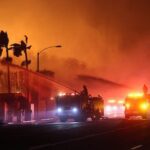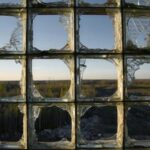Battle Dress: Poems
By Karen Skolfield (W. W. Norton & Company, 2019)
Winner of the Massachusetts Book Award in Poetry
At seventeen years old, Karen Skolfield joined the Army. For seven years she served as a journalist. Now she teaches poetry to engineers. In plain language and free-wheeling verse, she demolishes stereotypes. There’s nothing sentimental, no nostalgia for military life in her poetry, even as she affords the subject of war making respect.
With her latest book, Battle Dress, Skolfield defines her own terms. Nine poems in this collection casually rethink militant words such as Rifle, Concertina Wire, Discharge, and “War: Origin < Old German, to confuse.” These poems play upon altered definitions, weaving simple associations into epiphanies.
For example, “Enlist: Origin < German, to court, to woo” starts at an imagined recruitment table and tracks the thoughts of recruiters and recruits. Skolfield ends the poem with a sharp comment on how the military breaks down recruits to fit into appropriate jobs: “someone’s got to be / the firing pin, someone else the trigger.” The technique creates new meanings for grenade, bayonet and, most cleverly, military flare. In “Chevron: Origen < rafter, also goat” Skolfield moves us from
in house parlance
the sistering of beams,
two women joined together
[to the] V-shape of a goat’s horns.
Collective noun: a tribe of goats,
the trip, the drove, if there were safety
in numbers we’d be drowning in goats,
cloven hooves, sign of the unclean.
The rank insignia of the enlisted, the “easily lead” but stubborn “if left to roam” illustrates some of the unlikely connections these poems provoke.
Origins of words, of symbols, titles, roles, and the identities of individual soldiers are important in Battle Dress because Skolfield has us understand that all of the above change over time and acquire new meaning. Importantly, several of these poems explore gender roles and sexuality with rare nuance:
Whatever someone else has built,
makes us want to knock it over.
Let us say pussy, pussy, pussy
and hate ourselves, let us see those
who lack strength and crush them,
let us beer can to the forehead.
Sexually charged language complicates this poem, “The Throwing Gap,” the title of which refers to a grenade throwing contest. It’s about more than just hazing in a male dominated environment. It’s a hard-minded poem that complicates sexual attempts at dominance. A drill instructor says, “God, seeing hand grenades thrown like that / gives me a hard-on.” And this exclamation escalates the conflict in this poem, which is about worthiness and drives home the poem’s awkward punchline in which Skolfield writes, “we who are now male” laugh and say “me too.”
Another example of the ripple effects of sexual language in a military context is in the poem “Nurse voted best in SAC.” This title starts as an example of a bad headline for a class of budding journalists, and at the end it becomes a bitter joke at the poet’s expense, as she disrobes for the nurse. The clash between cultural expectations for what is masculine and and what is feminine is palpable. There’s also a subtle acknowledgement of the loneliness for those with queer identities in these settings. With her adroit word play, Skolfield changes the way we think about language, what’s appropriate, and how our roles shift through time and perspective.
Skolfield earned her MFA in Creative Writing from UMass Amherst, where she now teaches. Her debut volume, Frost in the Low Areas (2013) intersperses poems of home and childhood memories with ones about her time in the Army. Battle Dress focuses only on her military experiences, leaving aside other subjects. In an interview with her alma mater Skolfield says that she left the military because of the “Don’t Ask, Don’t Tell policy that was a witch hunt for LGBTQ soldiers” Her work plays deftly on the difficult topics of sexuality, and avoids academic platitudes.
Several poems in this current book allude to the intimacy of living in close quarters, wearing the same outfits. “I wove leaves into her helmet, tried / to stay still and shivered as she softened / the lines from brown to green” she writes of applying camouflage with her battle buddy. Touch in these poems triggers impressions of exploration, and eases pain “to smooth my cramped muscles / and shut me up.” The eroticism appears at times privately therapeutic, while at other times is harshly aware of the male gaze:
Don’t you wish his eyes
would go somewhere else?
When saluting the arm should make
an audible snap.
The friction created by the feminine occupying masculine spaces (and visa-versa) becomes palpable through these details of the senses.
One of her professors, Dara Wier, pulled Skolfield aside after class once and encouraged her to write more about her military experiences. You can read Wier’s influence on her style too, in its clarity and conversation-like exposition. There’s also a deep echo of Elizabeth Bishop’s nonchalant wisdom, dealing playfully in serious subjects. Her approach shows the practice of a deep and studied reader. “Everything I read influences me,” she said in an interview with Bloom-Site. She explains that what she learned while analyzing texts with teachers like James Tate and Agha Shahid Ali makes her more thoughtful in all areas of life.
Several of Skolfield’s texts in this light collection are rooted in formal publications: the dictionary, news articles, and the Army SMART books. Taking small tidbits of info, she free associates, adding deviant definition to these traditional and standardized forms. While suggesting a journalistic sensibility, the poems of Battle Dress tell of joys and heartbreaks in the experiences of warfare. The end of the book moves past the individual actions of soldiers and wonders pointedly about the conflicting legacy war leaves. Skolfield asks about how that legacy is seen and not seen, performed and distorted.
The penultimate poem shows the poet, Skolfield describing her children’s reactions at a Civil War Reenactment. The final poem reports on a trip to Manassas/Bull Run, where the hummingbirds and corn have retaken the battlefield, an image of transformation without any butterflies, where “The children are not scared.” The ghosts of war are preserved, but only in “bar names and street signs.” For those who have experienced war, however, the legacy is preserved in memories and the body which Skolfield describes as behavioral questions:
Do you escalate or de-escalate
scare when fireworks,
sit with back to the wall,
avoid crowds, avoid intimacy
feel the tinder inside, strike the match
have a place to go.
Every war ends, and then what?
Caleb Nelson
Caleb worked as an Aviation Electrician (AE3) for a Super Hornet squadron, U.S. Navy 04-08. He earned an MA in Creative Writing from UMass Boston in 2015. His work has appeared in Write on the Dot, The Baystate Banner and The Dorchester Reporter.








